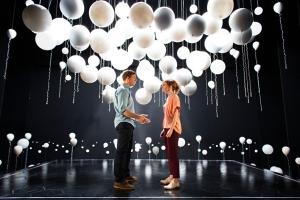Constellations - Trafalgar Studios 2015
There's something equally comforting and refreshing in the return of Nick Payne's intimate play to London, following an initial outing at the Royal Court, a West End and Broadway transfer and a UK tour. It's a small play that deals with big ideas which has managed to make quite an impact on both sides of the Atlantic. Unlike its predecessors this incarnation stands firmly on its own two feet and doesn't rely on the celebrity status of the cast, which in the past has included Jake Gyllenhaal and Rafe Spall, and in this revival the production is the star.
The surface story is a relationship drama between Roland and Marianne, who meet at a BBQ and seem to experience ordinary situations all couples go through - at least on stage. Infidelity, insecurities and marriage proposals make for a highly relatable linear narrative that may seem fairly pedestrian. The beauty however comes from Payne's delivery of the relatively simple story as he presents the same small scenes over and over with slightly different outcomes, and this is where quantum theory comes into play. Are our life choices predetermined or does fate control our every action?
As the stop-start action unfolds we see the variations in their relationship - the 'what ifs' and the 'what might have beens' - never having to accept one over the other. This builds a complex system of outcomes tightly connected much like the beehive construction that forms the playing space, linking the seemingly unconnected professional lives of Roland the bee keeper and Marianne the scientist.
It's a heavy idea, but one that's presented effortlessly. The simplicity in the dialogue between the two characters allows each scene to be re-examined with slight variation without ever feeling trite or deliberate. The subtle shifts are handled well by both Joe Armstrong and Louise Brealey who each bring a new quality to these roles that make you feel like you're watching it for the first time.
On paper there's a risk that this concept could get too heavy, but Michael Longhurst's careful direction makes for a perfectly paced, subtle exploration that constantly takes you to the brink of emotion and back again whilst never allowing the piece to feel over sentimental or bathetic. The perfect syncopation of lighting, design, sound and direction has all areas working coherently for the same aim, and the result is a knock out.
Originally published on
